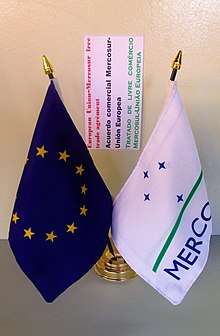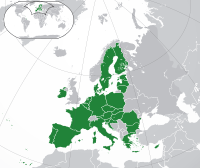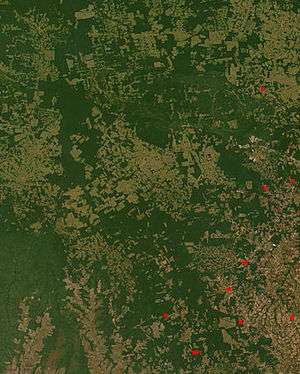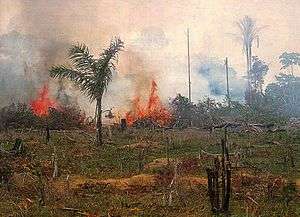European Union–Mercosur free trade agreement
The European Union–Mercosur free trade agreement is a free trade agreement on which the EU and Mercosur reached agreement in principle in 2019.[1] The deal was announced at the 2019 G20 Osaka summit after twenty years of negotiations.[1][2] Although there is agreement in principle, the final texts have not been finalised, signed or ratified and therefore has not entered into force. If ratified, it would represent the largest trade deal struck by both the EU and Mercosur in terms of citizens involved.[2] The trade deal is part of a wider Association Agreement between the two blocs, currently under negotiation.[3]

Background
.svg.png)
Dark green: full member states
Blue: acceding future members
Red: suspended members
The agreement came after twenty years of negotiation. Talks began in 1999[2] but stalled before regaining momentum in 2016.[4] Talks had foundered for years due to opposition from European beef producers, especially small farmers who feared being undercut on price by imports from Brazil, the world's biggest beef producer.[5] Many governments in South America at this time preferred "south-south co-operation" to developing ties with Europe, while European governments similarly had other priorities.[6]
The growing use of protectionist policies by national leaders is considered to have spurred the renewal of talks in 2016.[7] The EU may be hoping that the deal represents a significant break in this global renewal of protectionism.[7] European Commission President Jean-Claude Juncker cited the deal as an endorsement of "rules-based trade" in a time of growing protectionism.[5] Mercosur may be hoping to use the deal as a model for future deals going forward.[7] Mercosur's presidents have already stated that they want to reach trade agreements with Canada and the EFTA.[6] Argentina's president Mauricio Macri has said that the agreement with the EU is "not a point of arrival but of departure".[6]
The EU is already Mercosur's largest trading and investment partner.[1] 20.1% of the trade bloc's exports went to the EU in 2018.[8] Mercosur exports to the EU were worth €42.6 billion in that year,[8] while EU exports to the Mercosur countries were worth €45 billion.[8] Mercosur's biggest exports to EU countries are agricultural products such as food, beverages and tobacco, vegetable products including soya and coffee, and meat and other animal products.[8] Europe's biggest exports to Mercosur include machinery, transport equipment, and chemical and pharmaceutical products.[8] The EU exported €23 billion worth of services to the South American trade bloc in 2017 while about €11 billion worth of services came from Mercosur into Europe.[8]
Despite the value of the trading, significant tariffs remain in place, meaning potential expansion of markets should these tariffs be removed.[1] The EU wants more access for its manufactured goods especially cars, which face tariffs of 35%, and more access to contracts for its firms and wine and cheese to sell.[1] The primary aim of the Mercosur countries is to boost sales of farm commodities.[1]
Features

The combined population of the two regions means that the deal would involve a population of 780 million.[5] It is the largest free trade deal agreed by Mercosur since the bloc's launch in 1991.[2] It also represents the EU's largest trade deal to date in terms of tariff reduction.[2]
For Mercosur the deal eliminates 93% of tariffs to the EU and grants “preferential treatment” for the remaining 7%.[2] The deal will allow increased access to the European market for Mercosur's agricultural goods, notably beef, poultry, sugar and ethanol.[2] The deal will likely also be good for Brazilian juice exporters and Argentine fish exporters.[7] The deal will also remove 91% of tariffs on EU exports to the Mercosur countries.[2] According to the Financial Times, “some of the most important wins for Europe include the slashing of duties on cars and car parts, chemicals, machinery and textiles, and improved market access for EU wine and cheese”.[2] €4.5 billion worth of duties will be saved, according to the European Commission.[3] The deal includes a standstill clause whereby remaining tariffs will not be raised above an agreed rate.[7]
The scope of the agreement is very broad.[9] Besides tariffs, it covers Rules of Origin, Trade Remedies, Sanitary and Phytosanitary Measures (SPS), Technical Barriers to Trade (TBT), Services and Investment liberalization, Competition Policy, Subsidies, State Owned Enterprises (SOE), Trade and Sustainable Development.. It also includes increased access to public procurement contracts and Intellectual Property Rights including "Geographical Indications" or protection for regional food specialities.[2] Legal guarantees will be put in place protecting 357 European food and drink products from imitation including Prosciutto di Parma and Fromage de Herve.[3] Customs procedures will also be simplified under the deal.[7]
If ratified, it will be phased in over 15 years.[6]
Opposition
The deal has been denounced by European beef farmers, environmental activists and indigenous rights campaigners.[5][10] Protests against the deal have taken place.[5][11] After Brazilian president Jair Bolsonaro received much criticism concerning the protection of the Amazon rain forest, both Ireland and France voiced concern, and threatened a veto on the agreement unless action is taken by the Brazilian government.[12]
European farmers
The deal is expected to trigger a huge surge of Brazilian beef exports to all EU countries.[8][13] Under the agreement, the EU will open its markets to a quota of up to 99,000 tonnes of beef per year at a preferential rate of 7.5% tariffs.[5] Farmers throughout the EU oppose this, particularly smaller farmers who fear being undercut on price.[5] The COPA-COGECA union, which represents 23 million farmers across the EU, warned the deal “will go down in history as a very dark moment”.[5] The Irish Farmers' Association denounced the deal as a “disgraceful and feeble sell-out”.[14]
Environmentalists

Of concern also is the potential environmental impact of the agreement, in particular that it could represent a setback in the fight against climate change.[13] The Amazon rainforest is one of the world's largest carbon sinks.[15] But the amount of carbon that the Amazon is absorbing from the atmosphere and storing each year has fallen by around a third in the last decade.[16] This decline in the Amazon carbon sink amounts to one billion tonnes of carbon dioxide – equivalent to over twice the UK’s annual emissions.[16] Since the election of Jair Bolsonaro as President of Brazil deforestation of the Amazon has intensified.[13] The deforestation of the Amazon is now at its highest rate in a decade, with 2018 seeing a 13% increase in deforestation.[13]
Cattle farming is the single largest driver of Amazon deforestation, and has been responsible for as much as 80% of the deforestation.[13][17] The current increased rate of rainforest destruction comes at a time of record beef exports from Brazil.[13] The fear is that the deal could lead to even more deforestation as it expands market access to Brazilian beef.[13] EU leaders have responded to criticism by stating that the terms of the deal do not contravene the targets of the Paris climate agreement and that the trade deal highlights a commitment to “rules-based trade”.[13] Yet, as Jonathan Watts points out, “there are countless reports of rule-breaking by Brazilian meat companies”.[13] Many experts consider the environmental provisions in the current text of the deal to be “toothless” as they lack enforcement powers [10] Brazil is a signatory to the Paris climate agreement but President Bolsonaro has criticised it and threatened to pull Brazil out.[18] As mentioned above, deforestation of the Amazon has intensified under Bolsonaro. He has been accused of weakening Brazil's environmental ministry,[10] encouraging farming and mining expansion in the area[10] and turning a blind eye to illegal destruction.[19] The current environment minister, Ricardo Salles, has imposed the lowest number of fines for illegal deforestation in a decade.[20]
According to Jonathan Watts ‘negotiations took almost two decades, which may explain why the outcome signed last week reflects the pro-industry values of the past rather than the environmental concerns of the present’.[13] An editorial in The Irish Times states “EU countries are committing to achieving net-zero carbon by 2050, but this will prove meaningless if the planet’s greatest carbon sink is destroyed.” [15] Former French environment minister Nicolas Hulot denounced the agreement in an interview with Le Monde, claiming that is "completely contradictory" to the EU's climate goals and warning that it would enable further destruction of the Amazon rainforest.[21] Fears have been expressed in the Financial Times that the “EU-Mercosur deal will cancel out climate efforts”.[22]
Indigenous rights activists

Aside from the threat to the climate, deforestation would directly impact Brazil's indigenous communities,[10] who are already facing a worsening situation. Since becoming President, Bolsonaro has attempted to strip the indigenous agency FUNAI of its responsibility to identify and demarcate indigenous land[19] and hand that power to the Agriculture ministry. Such a move would "put the fox in charge of the chicken coop", according to opposition Senator Randolfe Rodrigues.[20] He has also defunded agencies responsible for law enforcement in the Amazon.[23] Indigenous communities are facing direct threats. In 2019 an estimated 20,000 goldminers illegally invaded Yanomami Indigenous Territory, one of Brazil's largest indigenous territories.[23] Yanomami campaigners have accused the president of encouraging the invasion by stating that indigenous people had too much land and that large-scale mining and extensive monoculture should be allowed on indigenous territory.[23]
Dinaman Tuxá, an indigenous leader, has said that "Accords like this only raise the level of violence against indigenous people. We need to tell the EU that signing this free-trade agreement could lead to genocide in Brazil. If they sign this agreement, blood will be spilled.”[10]
On June 18, 2019 over 340 civil society organizations wrote to call on the EU to halt the trade negotiations immediately and use their leverage as Brazil's second largest trading partner to improve the human rights situation in Brazil under Bolsonaro.[24] The letter noted the decision to put indigenous land demarcation under the remit of the Agriculture ministry where the agribusiness lobby has powerful sway and repeated attacks and invasions of indigenous land by profit seekers.[24] It also noted previous suspension of trade preferences with countries involved in human rights violations such as Myanmar and the Philippines in addition to restricting import of products related to human rights abuses such as conflict minerals.[24] This letter echoed a similar plea made in May by 600 European scientists and 300 indigenous groups, which called on the EU to demand that Brazil respect environmental and human rights standards as a precondition for concluding the Mercosur trade negotiations.[19]
Finalization, Signature and Ratification
.jpg)
After the adoption and publication of the 17 page "agreement in principle" on 1 Juli 2019, 29 unfinished texts of chapters and annexes of the trade agreement where published in July and September with a disclaimer that they were published "for information purposes only and may undergo further modifications including as a result of the process of legal revision". The essential liberalization schedules for goods, services and investment have not yet been released.[25] Once the texts are final and legally revised they will need to be translated in all EU and Mercosur official languages.[26] It may be up to two years before final text is available.[26] In the meantime negotiations for the two other pillars of the EU-Mercosur Association Agreement, namely "polical dialogue" and "economic cooperation" continue. After finalization the draft association agreement must be signed and ratified by the European Council, the European Parliament, Mercosur and national parliaments, a process that may take many years in itself.[2] An EU association agreement must also be approved by the national parliaments of EU member states. However, the European Commission may decide to present the trade pillar as a separate trade agreement. In that case only the European Parliament will need to vote on the deal.[26] The national parliaments of the Mercosur countries need to ratify the agreement in any case.[27]
There are a number of potential barriers which could stop the deal being ratified. For example, the election of a more left-wing candidate in the 2019 Argentine general election.[2] The increased presence of environmentalists in the European Parliament following the 2019 election has also been noted.[2] The Economist speculates that distance and other priorities may cause of a loss of interest similar to that which delayed the talks for so long.[6]
In July 2019 a symbolic motion rejecting the trade deal was passed in Dáil Éireann, the lower house of the Irish legislature, by 84 votes to 46.[11] The current government supports the deal however.[11]
In September 2019, lawmakers on the Austrian parliament's EU subcommittee almost unanimously voted to reject the draft free trade agreement citing concerns over their national farming sector and the Amazon forest fires. As such the government is obliged to veto the pact at EU level, where all 28 member states and their parliaments must agree to trade deals. Lawmakers from the centre-right ÖVP and the far-right Freedom Party also voted to reject the deal.[28]
See also
References
- Philip Blenkinsop, Leika Kihara (June 28, 2019). "EU, Mercosur strike trade pact, defying protectionist wave". Reuters. Retrieved July 1, 2019.
- "EU-Mercosur trade deal: what it all means". Financial Times. Retrieved 27 July 2019.
- "EU and Mercosur reach agreement on trade". European Commission. Retrieved 27 July 2019.
- Maria Ramirez Uribe and Caitlin Hu (June 29, 2019). "After 20 years of negotiations, EU strikes trade deal with Mercosur". CNN. Retrieved July 1, 2019.
- "Macron defends EU-Mercosur trade deal, as farmers protest". euractiv.com. Retrieved 27 July 2019.
- "Latin America and Europe have much to gain from closer ties". The Economist. Retrieved 5 August 2019.
- "A new trade deal has FOMO as its secret sauce". The Economist. Retrieved 27 July 2019.
- "EU/Mercosur trade deal - What you need to know". RTE. Retrieved 27 July 2019.
- https://trade.ec.europa.eu/doclib/docs/2019/june/tradoc_157964.pdf
- "EU's green trade promises face rainforest reality". Politico. Retrieved 27 July 2019.
- "Dáil rejects EU-Mercosur trade deal in symbolic vote". thejournal.ie. Retrieved 27 July 2019.
- https://www.aljazeera.com/ajimpact/ireland-block-eu-mercosur-trade-deal-amazon-fires-190823095908509.html
- "We must not barter the Amazon rainforest for burgers and steaks". The Guardian. Retrieved 27 July 2019.
- "Farmers, environmentalists slam 'sell-out' EU-Mercosur trade deal". France24. Retrieved 27 July 2019.
- "The Irish Times view on the Mercosur trade deal: the EU puts down a marker". The Irish Times. Retrieved 27 July 2019.
- "Amazon rainforest is taking up a third less carbon than a decade ago". Carbon Brief. Retrieved 27 July 2019.
- "Environmental criticism mounts over EU-South America trade deal". The Financial Times. Retrieved 27 July 2019.
- Escobar, Herton (2019-01-22). "Brazil's new president has scientists worried. Here's why". Science | AAAS. Retrieved 2019-01-25.
- "Brazil's Bolsonaro presses anti-indigenous agenda; resistance surges". Mongabay. Retrieved 27 July 2019.
- "On the brink" (August 3rd to August 9th 2019). The Economist.
- "EU-Mercosur trade deal will drive Amazon deforestation, warns ex-minister". Climate Change News. Retrieved 10 August 2019.
- "EU-Mercosur deal will cancel out climate efforts". Retrieved 27 July 2019.
- "Yanomami Amazon reserve invaded by 20,000 miners; Bolsonaro fails to act". Mongabay. Retrieved 27 July 2019.
- "340+ ORGANISATIONS CALL ON THE EU TO IMMEDIATELY HALT TRADE NEGOTIATIONS WITH BRAZIL". fern (pdf in link). Retrieved 27 July 2019.
- https://trade.ec.europa.eu/doclib/press/index.cfm?id=2048
- "Will Ireland have a vote on the Mercosur deal?". Irish Examiner. Retrieved 29 July 2019.
- "Mercosur bloc leaders meet to fast-track EU trade deal". Al Jazeera. Retrieved 29 July 2019.
- Oltermann, Philip (19 September 2019). "Austria rejects EU-Mercosur trade deal over Amazon fires; Concerns about threats to farming sector also featured in Austrian parliament debate". The Guardian. Retrieved 3 October 2019.